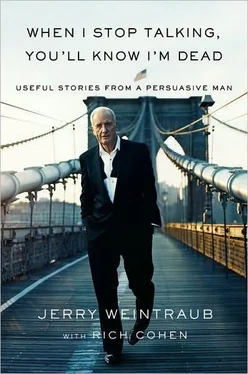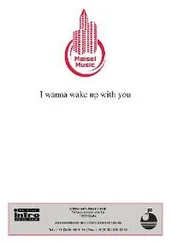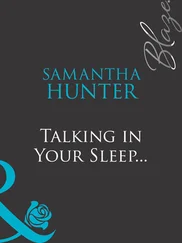The movie was finished. I was convinced we had a smash. But when I showed it to the business people at Warner Bros., they sat through it politely, without comment.
Well, yes, they said when it was done, it's a nice little picture.
Nice little picture? No, I said, it's a great film. But it will be huge only if we treat it like it's huge. I said I wanted five million dollars to market it on television. They told me I was insane. Back then, no one advertised movies on TV. "Look, TV is where John Denver is a star," I told them. "It's where his fans are. You show them the movie, and let them know about it, you will have a monster hit on your hands." They told me to go away. The movie had cost less than two million dollars to make. There was no way they were going to chase that two million with five million for commercials.
I spoke to Terry Semel, who was the head of distribution at Warners-he wound up running the company-and Andy Fogelson, who was the head of marketing. I made them watch the movie again, then argued my case. They fell in love with it. They went in to their bosses and said, "Give Jerry the money." They put their jobs on the line. Terry said, "If this fails, I'll quit the company." It was a huge moment for me and Terry-we've been friends ever since. We went on television with the biggest ad campaign Hollywood had ever seen, found John's fans, and hit them squarely, the result being a summer of packed theaters. We made history.
While making the movie, I became friendly with George Burns. Jane and I decided to throw a party for his eightieth birthday at our house in Beverly Hills. For that one night, the world was as I had always imagined it. Invitations went out by hand: black-and-white cards with a red rose. The party was catered by Chasen's. Dinner on the tennis court, dozens of tables under white cloths, torches and tiki lamps, a jazz band. Frank Sinatra, Kirk Douglas, Cary Grant, Gene Kelly, Johnny Carson, everyone was there. As Louis B. Mayer used to say, "More stars than in the heavens." At one point, Groucho Marx got up for an impromptu roast of George Burns. Groucho was old and failing, but he was brilliant. Goddamn, he was funny. It was Groucho's last public performance. The party went all night. When I came downstairs in the morning, I found the young stars of Hollywood passed out on the floor, some of whom had won Grammies or Golden Globes the night before. They were in their suits, hugging their statues, snoring away.
Or take, for example, Cruising-another set of problems solved-which I made after Oh, God!. It's the story of a New York cop who goes undercover in the gay leather bars of New York to solve a series of murders. It was based on a true story, having first been reported in a series of articles in the New York Times. I bought the rights to the book that came out of the articles, put the screenplay in a drawer, and waited for the right moment.
Meanwhile, I hooked up with director Billy Friedkin, who had just come off the career-making success of The Exorcist. We became friends, decided to make a movie together. Then, one night, as we were talking, I remembered Cruising. I got the book out of my drawer, handed it to Billy. "Look at this," I said. "It might be for you." He knew the story, having followed it in the paper.
"I love this," he said. "We're making this movie."
We met with Frank Wells, who was then vice chairman of Warners. We pitched the movie. He signed off on it without understanding what he was signing off on. He probably thought it was about cars. Billy and I were so hot at that moment-Oh, God!, The Exorcist-that he just said "Yeah, yeah, do it." Then, just before we were to begin shooting, Wells suddenly figured out the movie was not about cars. There would be controversy, noise. He told us Warners could not make the movie. I was in a fury. We had already begun to rehearse, but Wells did not care. It was a bad moment, but in the end we managed to set up the movie at Lorimar Pictures.
A few years had passed since the book was published, and in those few years, the world had changed. The gay community had begun its liberation. People were coming out of the closet. In hopes of getting it right, Billy and I hit all the leather bars of the West Village, then shot the movie in these locations. A reporter from the Village Voice got the script early, then infiltrated the set, where he heard wild rumors, the result being a hysterical article that denounced the film, denounced Billy, and denounced me. It said we were exploiting the gay community, that lives would be put in danger. That it was all bullshit was beside the point. Being in the newspaper made it true. As I said, the job of the producer is solving problems, and this was a big one: Just like that, our sleepy set had turned into a riot scene. Thousands of people came out to protest. They stomped their feet, flashed lights, and blew whistles when we were trying to shoot. We burned up thousands of dollars in film. Then the letters came: You're dead. We're going to kill you, Weintraub. Garbage like that. I did not mind the threats. In this case, my job was to be the loudmouth, the target, take the hit and let the fury of the mob break over my head, giving the actors room to perform. I mean, we had Al Pacino, and it's hard to do the Method while you're being filmed for the five-o'clock news.
In the end, the press was good for the movie. The articles sold the product. One day, Steve Ross, who was the CEO of Warner Bros.' parent company, Warner Communications, and also a friend, said to me, "Wow, Jerry, you are getting so much attention with the picture. Why aren't we doing it?"
I told him the whole story.
He said something like, Well, whatever you want to make next, we want to be involved.
Cruising came out in 1980. It did well at the box office, pushed along by all that coverage. Of course, the movie, in many ways, came too early. If it was released today, when people have opened their minds to lifestyles that differ from their own, it would do gangbusters. As I always say, "Better too late than too early." Too late means you look slow but still make a bundle. Too early means you look like you've lost your mind, and you get people shouting, "Kill that idiot." But it also means there is a chance for rediscovery. In the end, that strange little picture we made in the seventies became a cult classic.
Soon after that, Friedkin said, "That was so much fun, let's do it again."
"Do what again?" I asked.
"Make another picture."
"Do you have anything in mind?"
"Yeah," he said. "Let's make a sequel to The Exorcist."
As an idea, this was automatic. He could have made it with any producer, but if you need a person to deal with studio executives and budgets and marketers and minutiae, well, I'm not a bad choice. Directors know I'm on their side of the table. I will fight for them, make their case, protect them. William Peter Blatty was a partner, as he owned the rights. And he would, of course, write the sequel. He had done such a brilliant job with the original as well as the novel it was based on.
Frank Wells got word of the project. He called and said, "Look, Jerry, I want it."
"After what you did to me on Cruising?" I said. "No way."
"You've got to let me have it," he said. "If we don't get it, it will kill my career with Steve Ross."
Frank Wells and I were actually friends-I did not want to hurt the guy.
He said, "Go to your office in the morning. There will be an envelope waiting. Look inside, then call me."
"What is it?"
"Just get the envelope, then call me."
I went in and there was the envelope. Inside was a check for five hundred thousand dollars.
I called Wells.
"What's it for?" I asked.
"Just to be the first to hear the pitch," he said.
"And what happens if you hate the pitch?" I asked.
Читать дальше

![Сьюзан Кейн - Quiet [The Power of Introverts in a World That Can't Stop Talking]](/books/33084/syuzan-kejn-quiet-the-power-of-introverts-in-a-wo-thumb.webp)










